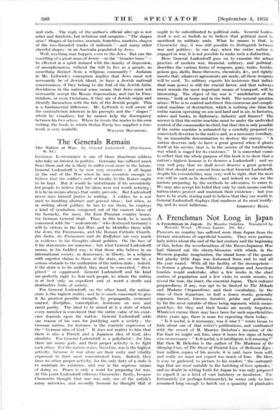The Generals Remain
The Nation at War. By General Ludendorff. (Hutchinson- fts. 6d.)
GENERAL LUDENDORFF is one of those disastrous soldiers who take an interest in politics. Germany has suffered much from them and she is likely to suffer even more in the future. General Ludendorff is by now very eccentric ; it all began at the end of the War when he was eccentric enough to believe that the soldier's oath of loyalty to the Kaiser ought to be kept. But it would be unfortunate if his eccentricity led people to believe that his ideas were not worth noticing ; it is by no means always that sanity prevails. But Ludendorff never does himself justice in writing. A soldier, he is not used to handling abstract and general ideas ; but when, as in writing about politics, he has to use them, he employs a kind of symbolism composed out of the current ideas of the barracks, the mess, the East Prussian country house, the German General Staff. Thus, in this book, he is much concerned with the " malcontents - who destroyed Gerrriany's will to victory in the last War, and he identifies them with the Jews, the Freemasons, and the Roman Catholic Church. Die Juden, die Preimanrer and die Radfahrer are very much in evidence in his thoughts about politics. On the face of if his statements are nonsense ; but what General Ludendorff means, in his fuddled way, is that those who believe in an international society, in democracy, 'in liberty, in a religion with superior claims to those of the state, are, or can be, a serious obstacle to the unification of the nation-state : indeed, if the state is to be unified, they must be converted, " disci- plined " or suppressed. General Ludendorff and his kind are perfectly right to fear such people, to whom the nation is at best only an expedient and at worst a sterile and destructive form of society.
For General Ludendorff, on the other hand, the nation- state is the highest reality, and he is much concerned to give it its greatest possible strength, by propaganda, economic crintrol, discipline, conscription, insistence on race 'anti racial purity. The ideal to be aimed at is a state of which emery member is convinced that the entire value of his exist- ence depends upon the nation. General Ludendorff adds one reason of his own for justifying such a society ; the German nation, for instance, • is the concrete expression of the " German idea of God." It does not matter to him that there is also a French and a Japanese idea of God, also absolute. For General Ludendorff is a polytheist ; for' him there are many gods, and their proper activity is to fight each other. For the nation-states, therefore, war is the highest activity, because in war alone are their unity and vitality expressed in their most concentrated form. Indeed, they have no other proper activity, for the only duty of a state is to maintain its existence, and war is the supreme means of doing so. Peace is only a word for preparing for war. At this point Ludendorff criticises Clausewitz firstly, because Clausewitz thought that war was only one of the natio'n's many -activities, and secondly • because he:thought—Hit& it ought to be subordinated to political ends. General Luden. dorff is not so foolish as to believe that political must be sacrificed to military ends. What he means is that, in Clausewitz' day, it was still possible to distinguish between war and politics ; in our day, when the entire nation is engaged in war, it is not possible to make such a distinction.
Here General Ludendorff goes on to examine the actual practice of modern war, financial, military, and political : describes the various forms of weapons, guns, tanks, bombs, poison gas, shells, flame-throwers, chemicals, &C., and rightly asserts that, whatever agreements are made, all these weapons will be used. To military experts his insistence that indivi- dual man power is still the crucial factor, and that railwdys must remain the most important means of transport, will be interesting. The object of the war is annihilation of the enemy," both at home and in the field. The natural question arises : Who is to control and direct this enormous and compli- cated machine of destruction, which is nothing else than the entire nation operating on sea and land and in air, in factories, mines and banks, in diplomacy, industry and finance? The answer is that the entire machine must be under the undivided control of the commander-in-chief, but that this is only possible if the entire machine is animated by a carefully prepared (or concocted) devotion to the nation and, as a necessary corollary, by an immutable determination to destroy the enemy. " A nation deserves only to have a great general when it places itself at his service, that is, in the service of the totalitarian war which is waged for its existence." It is somewhat comic to reflect that the whole purpose of this book is to show that a nation's highest honour is to deserve a Ludendorff ; and we may well pray that we shall never deserve a great general. But that should not conceal from us that General Ludendorff, despite his eccentricities, may very well be right, that the next war will be such as he describes ; and indeed we can see the nations preparing, by the methods he advocates, to enter it. We may also accept his belief that only by such means can the nation-states protect and maintain their existence ; but you have to be stark, staring mad to believe that they are worth it. General Ludendorff displays that madness at its most terrify-






































 Previous page
Previous page